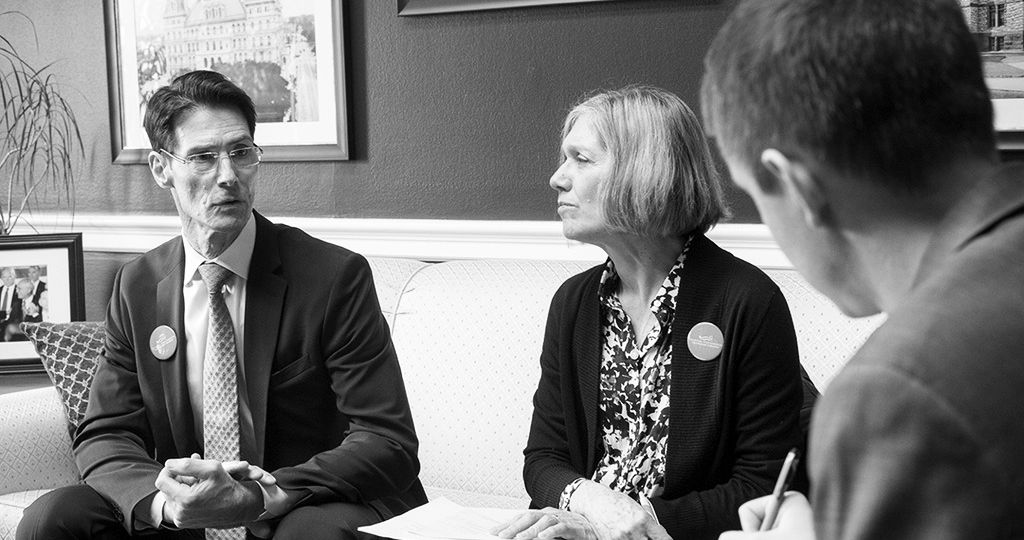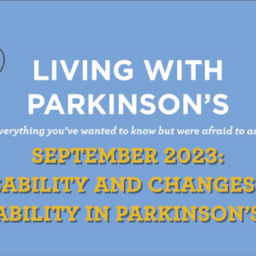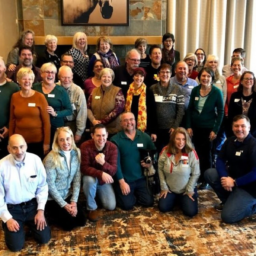Written by Steve Hovey, Davis Phinney Foundation Ambassador
This past February, my wife, Nancy, and I had the privilege of representing the Davis Phinney Foundation at the 2017 Parkinson’s Policy Forum in Washington, D.C. hosted by The Michael J. Fox Foundation.
The Policy Forum is a 3-day event, culminating with a full day on Capitol Hill where Parkinson’s advocates meet with elected officials to discuss key issues critically important to people living with Parkinson’s. Sunday and Monday were dedicated to getting a deep understanding of the issues, how to best to present the information to congressional representatives and senators, and role playing with others from our respective states to practice our presentations.
Advocating on Parkinson’s Issues
The issues we focused on in our presentations to our elected officials were:
- Access to affordable healthcare and the importance of the “no pre-existing conditions” provision
- Continued funding for Parkinson’s research
- Support of the “Raise” Caregiver Act
Here are facts about Parkinson’s we shared with our representatives:
- There are currently 80,000 military veterans with Parkinson’s.
- The average annual cost of treatment for a Parkinson’s patient is $17,000.
- 80% of people living with Parkinson’s in the U.S. are on Medicare.
- The estimated annual cost for the U.S. Parkinson’s community is $16.6 billion.
- The estimated value of caregiver’s services (offered free) is a staggering $460 billion dollars, yet they often get no monetary relief. And get this: 25% of caregivers are millennials!
- The number of people diagnosed with Parkinson’s will double by 2040.
For each of these three key issues, we prepared important highlights to share with our government representatives:
We need to make sure key provisions of the Affordable Care Act remain in place.
These include:
- Maintaining the ban on pre-existing conditions
- Eliminating caps on annual or lifetime coverages
- Maintaining and strengthening Medicare, especially Part D
- Eliminating the therapy cap
Stopping the progression of Parkinson’s would, besides offering obvious benefits to those living with it, represent a significant cost savings to Medicare. Based on the facts noted above, Parkinson’s costs Medicare approximately $13 billion; yet, only $152 million is invested in Parkinson’s research through the National Institutes of Health (NIH).
There are currently five drugs in clinical trials that address aggregation, or clumping of the alpha-synuclein protein on the brain. This has become a consistent biomarker for Parkinson’s, thought to be the culprit for the progression of Parkinson’s symptoms. If successful, the hope is one or more of these drugs in clinical trials could stop the progression of the disease. Imagine how wonderful it would be for the Parkinson’s community? Imagine how much money Medicare, or any insurance provider, will be saving on Parkinson’s-related medical reimbursements? An increase in the funding of research would be money well spent.
Here’s a snapshot of the current funding, by the numbers:
- Of the $36.1 billion in NIH funding, the NIH currently supports approximately $152 million in Parkinson’s research, making it the largest public funder of Parkinson’s research. However, funding to the NIH for Parkinson’s research has been flat over the past twenty years. To put this into perspective, $3 billion was invested in AIDS research over the same period of time. The Michael J. Fox Foundation currently kicks in another $100 million and is on track to invest as much towards Parkinson’s research as the NIH will in the future.
- There is currently $2.8 billion in FDA funding, which is considered inadequate to support all drugs in the pipeline going for approval.
- There’s $20 million for the Department of Defense Parkinson’s research program, which, surprisingly, may be at risk. The funding was decreased to $16 million in 2016 and in jeopardy of being eliminated altogether.
- There is another $5 million being asked for to implement the National Neurological Conditions Surveillance System at the CDC.
Strengthen and support caregiving in America by supporting the Recognize, Assist, Include, Support and Engage (RAISE) Caregiver Act. This act is in the preliminary stages and has been set up to address the unique challenges many caregivers face. Aside from the emotional toll, many caregivers must leave their job, which often leads to a myriad of financial difficulties.
Making My Voice Heard in Washington, DC
This was an incredible experience for both me and Nancy. We quickly realized the stark difference between what we do as representatives of the Davis Phinney Foundation and the business of policy-making in the Capitol. Affordable government healthcare, provisions such as the “no existing conditions,” as well as funding for research, are all extremely dependent on the federal government. Budgets are reviewed and set annually and they always seems to be a battle. As the two parties remain at odds with each other, consistently advocating for our cause is extremely important.
As we know, the Affordable Healthcare Act in its current form is hotly debated and will likely look different in the future. There seems to be more bi-partisan support for NIH funding, but with President Trump’s new budget focusing so much money on defense, cuts in discretionary spending may have an adverse impact on some research and healthcare benefits funding.
What became evident to me is that we all can make a difference by meeting with our US elected officials and educating them on what life is like with Parkinson’s, explaining personally why it is imperative that the issues bulleted above are supported across party lines.
How You Can Take Action
Both Nancy and I walked away from the Policy Forum with a whole new perspective on “The War on Parkinson’s.” On the living-with-it front, the tremendous work of the Davis Phinney Foundation is so very necessary. The other side of the war is what we experienced in D.C. It’s advocacy for adequate healthcare, funding research, legislation and, of course, politics. The divide between the parties is very real – we could hear it during our day on Capitol Hill. There is bipartisan support for funding research and the FDA, but we need more. The ACA is going to be a battle.
Our collective voice will make a difference. Congressional representatives, senators and their aides listen to their constituents back home, and that includes the Parkinson’s community. We can’t just fight this fight for one day, during the annual Policy Forum. We need to take it home to our respective state representatives. I plan on doing so over the next couple months and would be happy to coach anyone interested in doing the same with their own state representatives. It ended up being a lot less intimidating than I thought it would be, and it was actually fun.
Get Involved. Contact Your Representatives.
It’s not as difficult as you may think to make your voice heard. You can call your congressional representative or senator at their local office or in their Washington, D.C. office. Some also maintain satellite offices around the state. All members of congress can also be contacted by email, and most maintain a social media presence, as well.
The important thing is to take action.
Visit usa.gov/elected-officials for a complete list of elected officials and how to contact them. Even if you can’t travel to the Policy Forum like we did, you can make sure that your senators and congressional representative hear loud and clear how important Parkinson’s issues are to you.













Comment my Parkinson’s has affected my walking only. I have no tremors, I just feel like my feet are glued to the floor sometime. when I go to exercise I can walk perfect with a walker. but when I get home I cannot concentrate or I am thinking of multiple things and I start stutter stepping again. It is so frustrating.
Freezing is common symptom people experience with movement. Freezing and slowed movement can be very frustrating, however, there are several things you can try in order to decrease the frequency of these occurrences. Please visit download the Gait, Balance, and Freezing worksheet and read the Tips for Freezing. I hope this helps!
I was diagnosed with pd in 2003. Anyone who spent any time with me knows that I have one main goal. That is to be the healthiest person alive with Parkinson’s disease. I am 56 years old and I figure that if I have to carry this cross it will be much easier if I manage to stay healthy. Also, Parkinson’s disease sucks. I try to keep a positive attitude and often use humor in dealing with pd. I could be bitchy but what would that help. There are plenty people dealing with plenty more than I am
I am blessed that I do not have to work and I can spend my time exercising at the gym or on my bike. You may be asking why is he telling us this. It is to show that if I can do this anyone can. It takes commitment and the belief that pd may get me but I ain’t going down without a fight.
Craig, you nailed it! In addition to having a dedicated exercise routine, a positive attitude is just as important. The key to having a positive outlook is acknowledging that you will have good days and not-so-good days when living with Parkinson’s. After that, it’s much easier to accept a bad day when it happens and remain hopeful for better days. Keep on moving and sharing that great attitude!
I thank you for taking time to be a voice for all of us. Still trying to live my everyday life of work and family despite my dx of PD. I attend a great support group where the people are very active on the advocacy side.
We are very proud for the work Steve has done for the Parkinson’s community. It’s so important to raise awareness of the issues affecting people living with Parkinson’s and the associated legislation.
Thank you for article. It reinforces to me why I advocate and why I must continue to advocate. I was also at the Forum (3rd time). It is critical and important work. It is not easy, but I found the more I talk and advocate, the more passionate I am about it. We just need more people to do it. Come join us!
Absolutely, Dan. It’s very important to advocate for issues that are important to you and hopefully your voice will be heard. Keep on sharing the message and encouraging others to do the same!
I wanted to update my ongoing battle with pd. I still am fighting the good fight, I exercise plenty and ny quality of life remains good. Some days are hard and I am reminded that I am dealing with a significant disorder.. I just focus on the good days. My biggest problem is what my neurologist callsfesination of gait. It is a side effect of the meds and is where your feet moves fast and before you know it you are running. Stopping is notan option and ocaaionally i crash into brick walls and various other objects. I am just trying not to hurt myself. Anyway God is good. life is good and I can do this.
Thanks for the update, Craig. There are numerous factors that can cause festination and not all can be remedied by medication. However, by exercising frequently and talking with a physical therapist, you can learn ways to build up strength, increase your energy levels, and improve your balance which can decrease the frequency of festination.